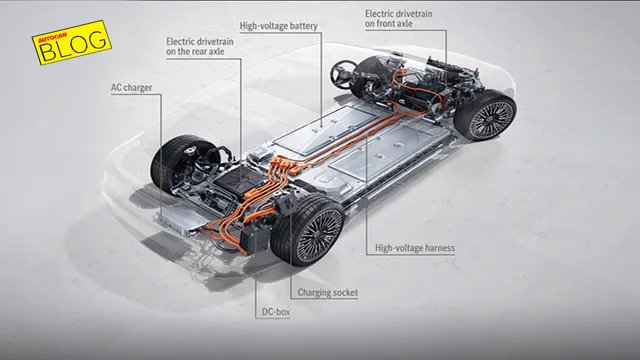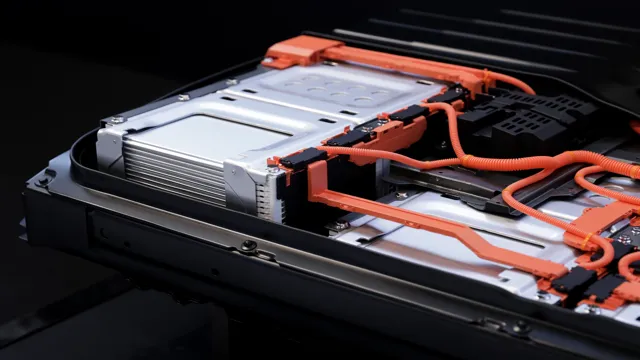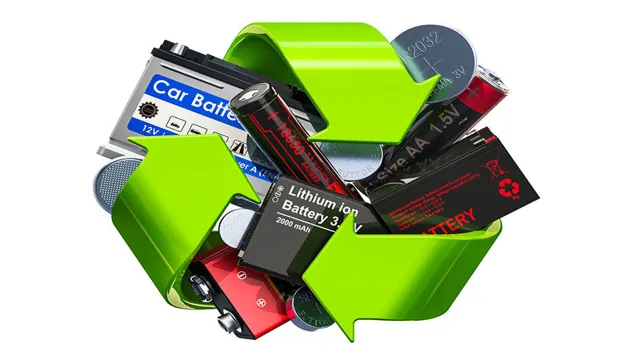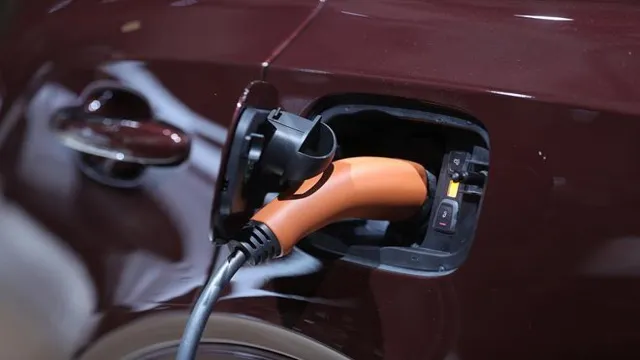Uncovering the Ecological Footprint of Electric Car Batteries: A Sustainable Revolution?
Electric cars have become more and more popular as people look for ways to minimize their environmental impact and reduce their carbon footprint. One of the major components of electric cars is the battery system, which not only allows the car to operate but also has a significant impact on its environmental impact. Many people wonder about the ecological footprint of electric car batteries, and whether they are more sustainable than traditional vehicles or not.
In this blog, we will explore the concept of electric car batteries and their ecological footprint, looking at the ways in which they compare to traditional gasoline-powered vehicles. We will delve into the factors that impact the ecological footprint of electric car batteries, such as their production, usage, and recycling, and consider how we can continue to develop and improve these technologies to enhance their sustainability further. Let’s dive in and discover more about the ecological impact of electric car batteries and how we can work towards a greener future.
Introduction
The rise in electric cars has certainly put the spotlight on their environmental impact, particularly when it comes to the battery. The ecological footprint of an electric car battery is a hotly debated topic, with some arguing that they are cleaner than their gas counterparts and others citing the potential for environmental harm caused by the sourcing and disposal of materials used in their production. However, one thing is clear – electric car batteries have a much lower overall carbon footprint than gas-powered vehicles.
Not only do they emit fewer emissions, but they also rely on renewable energy sources, which is a big win for the planet. Even though there is still some work to be done in terms of improving the production and disposal methods, the shift towards electric cars is a step in the right direction towards a cleaner, greener future.
Explaining the ecological footprint of batteries
As the world shifts towards more sustainable and eco-friendly sources of energy, batteries have become an increasingly popular solution. However, it’s important to understand the ecological footprint of batteries and their impact on the environment. The term ‘ecological footprint’ refers to the measure of how much land, air, and water is required to produce a product and dispose of its waste.
When it comes to batteries, their production requires the extraction of raw materials such as lithium, cobalt, and nickel, which can lead to environmental degradation. In addition, the disposal of batteries can also pose a serious threat to the environment if not done properly. So, it’s crucial to understand the overall impact that batteries have on the environment and take necessary steps to mitigate any negative effects.

Why electric car batteries are relevant to ecological footprint
Electric car batteries are becoming an increasingly popular choice for people looking to reduce their carbon footprint. The batteries are not only efficient and environmentally-friendly, but they also have a significant impact on the overall ecological footprint of the vehicle. This is because the production, use, and disposal of these batteries can have numerous effects on the environment, including the release of harmful chemicals and materials.
It is, therefore, essential to understand why electric car batteries are so relevant to the ecological footprint and how they can help to reduce it. In this blog post, we will explore this topic in more detail, including the benefits of electric car batteries and their potential impact on the environment. So, let’s dive in and learn more about the role of electric car batteries in reducing our ecological footprint!
Electric Car Batteries and Comparisons
When it comes to the ecological footprint of electric car batteries, there are a few factors to consider. While electric cars produce zero emissions while driving, the manufacturing of their batteries can have a significant impact on the environment. The production of lithium-ion batteries, which are commonly used in electric cars, requires the mining of materials like lithium and cobalt, which can be harmful to the environment.
However, the good news is that the production of electric car batteries is becoming more sustainable. Many companies are working to reduce the amount of raw materials required for each battery, and some are experimenting with more eco-friendly materials like sodium-ion batteries. Additionally, companies are working to improve the recycling process for used batteries, which can help to reduce their impact on the environment.
Overall, while electric car batteries do have an ecological footprint, it is important to remember that they are still cleaner and more sustainable than traditional gas-powered cars.
Comparing electric car batteries to traditional engines
When it comes to comparing electric car batteries to traditional engines, it’s like comparing apples to oranges. Firstly, electric car batteries use electricity to power the motor, while traditional engines rely on gasoline or diesel to fuel the combustion process. This means that electric cars are more efficient and emit zero emissions, making them more environmentally friendly than traditional engines.
Additionally, electric car batteries last longer than traditional engines as they don’t rely on mechanical components that wear out over time. On the other hand, traditional engines offer more power and speed, but at the cost of higher emissions and lower fuel efficiency. Ultimately, the choice between an electric car battery and a traditional engine comes down to personal preference and priorities, but the trend is moving towards electric cars as technology continues to improve and emissions regulations become stricter.
Comparing electric car batteries to other battery alternatives
Electric car batteries have become increasingly popular due to their eco-friendliness and efficiency. However, it’s important to compare them to other battery alternatives to fully understand their benefits and drawbacks. For example, lithium-ion batteries, which are commonly used in electric cars, have a higher energy density compared to lead-acid batteries and can charge faster, but they are also more expensive.
Nickel-metal hydride batteries have a lower energy density than lithium-ion batteries, but they are more affordable. It’s important to consider factors such as cost, energy density, and environmental impact when deciding which battery alternative is best for your specific needs. By weighing the pros and cons of each option, you can make an informed decision that aligns with your values and priorities.
Explaining the life cycle of an electric car battery
Electric car batteries have come a long way over the years, with various types available on the market. The most common types are lithium-ion, nickel-metal hydride, and lead-acid batteries. Lithium-ion batteries are the most widely used in electric cars because they are lightweight and offer higher energy density.
They can also last for several years but are more expensive than other types. Nickel-metal hydride batteries are another popular option, known for their excellent energy density and lower cost compared to lithium-ion batteries. However, they are heavier and less energy-efficient than lithium-ion batteries.
Lead-acid batteries are the oldest technology used in electric cars and are less energy-dense but more affordable than the other two. Regardless of the type, batteries are essential to the operation of electric vehicles and have a specific life cycle that varies depending on the type. A battery’s life cycle is based on three factors: charge, capacity, and ageing.
With proper care and maintenance, electric car batteries can have a long and productive life, making them an attractive option for environmentally conscious drivers.
Environmental Impact of Electric Car Batteries
The invention of electric cars has revolutionized the automobile industry and come as great news to the environment. However, the electric car’s ecological footprint is something to consider. A crucial aspect of the electric car is the battery, which contributes to the vehicle’s environmental impact.
The production process of electric car batteries requires a considerable amount of energy, and this comes from fossil fuels. Also, the processes used to mine raw battery materials, such as lithium and cobalt, are often harmful to the planet. The disposal of end-of-life batteries is also an environmental concern as it can lead to toxic waste and pollute the soil and water.
Nonetheless, electric vehicle manufacturers are working to reduce their batteries’ environmental impact by adopting sustainable mining practices, innovative recycling techniques, and energy-efficient manufacturing processes. In conclusion, although electric cars have environmental advantages, their batteries’ impact on the earth should also be considered.
Explaining the process of mining materials for batteries
The process of mining materials for batteries has a significant impact on the environment. One of the most crucial materials is lithium, and its extraction requires large amounts of water and can harm local ecosystems. Furthermore, cobalt, nickel, and manganese mining can produce hazardous waste and release sulfuric acid into water bodies, harming aquatic life and vegetation.
Additionally, mining activities often lead to deforestation, soil erosion, and air pollution. The environmental impact of electric car batteries begins with the extraction process and extends throughout the lifecycle of the battery, including production, use, and disposal. However, researchers are actively exploring alternative materials and more sustainable mining practices to mitigate the negative effects.
By transitioning to eco-friendly battery production methods and sourcing materials from responsible mining practices, manufacturers can minimize the environmental impact of electric car batteries while still meeting the growing demand for sustainable transportation solutions.
Addressing concerns over toxic chemicals in batteries
As the popularity of electric cars continues to grow, there are concerns about the environmental impact of their batteries. One of the most significant concerns is the potential for toxic chemicals within the batteries to harm the environment. While it’s true that many electric car batteries contain chemicals such as lithium, nickel, and cobalt, there are processes in place to ensure that these chemicals are handled responsibly.
Battery manufacturers are continuously working to reduce the use of these toxic chemicals, with new, more sustainable battery chemistries such as solid-state batteries being developed. Additionally, recycling programs are being implemented to recover valuable materials from used batteries and reduce the amount of waste that ends up in landfills. With these efforts, the impact of electric car batteries on the environment is being minimized, and the transition to electric vehicles is becoming more sustainable.
Future Development and Solutions
The ecological footprint of electric car batteries has been a topic of concern for many, but the good news is that efforts are being made to reduce their impact on the environment. One solution is the use of recycled materials in battery production, which reduces the need for raw materials and lowers energy consumption during manufacturing. Another development is the creation of more efficient and longer-lasting batteries, reducing the need for replacement and ultimately decreasing their overall ecological footprint.
Additionally, the use of renewable energy sources to power electric cars can also greatly reduce their environmental impact. While there is still work to be done in making electric car batteries more sustainable, these solutions show promise in creating a more eco-friendly mode of transportation.
Promising research on reducing the ecological impact of batteries
As our energy needs continue to grow, so does the demand for batteries. However, these batteries can have a significant environmental impact from the manufacturing process to disposal. But there is promising research in reducing this ecological impact.
For instance, researchers have developed a new type of battery that uses seawater as an electrolyte instead of a toxic chemical. This innovation could significantly reduce the amount of hazardous waste generated during battery production. Additionally, some companies are exploring how to efficiently recycle batteries, mitigating the need for manufacturing new ones.
As we continue to innovate and develop new solutions, we can work towards a more sustainable future for batteries and their impact on the environment.
Explaining the importance of proper disposal of used batteries
Proper disposal of used batteries is crucial in reducing the environmental impact of these hazardous materials. As we aim for future development and sustainability, solutions must be implemented to safely dispose of old batteries. One solution is to recycle them in authorized facilities that can extract valuable metals like nickel, cobalt, and lithium.
These metals can then be reused to create new batteries, reducing the need for raw materials and reducing the environmental harm caused by mining. Another solution is to use rechargeable batteries instead of disposable ones. This reduces the amount of waste created and minimizes the environmental impact of battery disposal.
It is essential that we take action to protect our planet and the health of its inhabitants. Proper disposal of used batteries is a small but significant step towards a greener future.
Conclusion
In conclusion, the electric car battery’s ecological footprint may seem daunting at first glance, but it’s important to remember that it’s all relative. Yes, the production of these batteries requires a significant amount of energy and resources, but compared to the carbon emissions and environmental damage caused by traditional gas cars, it’s a step in the right direction towards a more sustainable future. And as technology continues to advance and improve, we can only expect the ecological footprint of electric car batteries to shrink even further.
So, let’s charge up our batteries and drive towards a brighter and greener tomorrow.”
FAQs
What is the ecological impact of electric car batteries?
The production and disposal of electric car batteries can contribute to environmental damage, but the overall ecological footprint is still lower than that of traditional gasoline-powered vehicles.
How long do electric car batteries typically last?
The lifespan of electric car batteries can vary, but they typically last for around 100,000 miles before needing to be replaced.
Are electric car batteries recyclable?
Yes, electric car batteries can be recycled. In fact, many automakers have implemented recycling programs to ensure that the materials used in these batteries are repurposed or disposed of responsibly.
How do electric car batteries compare to traditional car batteries in terms of energy efficiency?
Electric car batteries are typically more energy efficient than traditional car batteries, as they can store and release energy on a more consistent and efficient basis. This can help reduce energy waste and promote sustainability over time.






